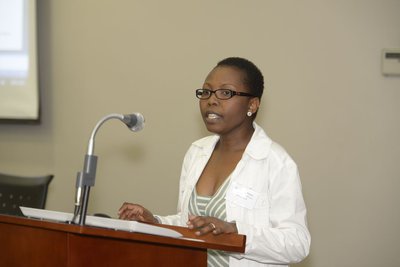7 Oct 2013
PhD Profile:Transferring knowledge from Bern to KwaZulu-Natal
Malebakeng Forere has just completed her doctorate under the academic partnership between the Swiss State Secretariat for Economic Affairs (SECO) and the World Trade Institute. Before returning to South Africa she shares her thoughts on her experiences at the WTI and her future plans.
What is your area of study?
I’ve been looking at dispute settlement in the global trading system to see how we can use dispute settlement institutions between the regional trade agreements (RTAs) and the WTO to find coherence. My premise is that it is fragmented at the moment and we need to have a coherent system. My PhD says we can bridge this gap if the two institutions – the regional trade agreements and the WTO - work together.
I submitted the first draft of my thesis in August and the final paper in October.
What will you do on your return to South Africa?
I’m going back to teach at the University of KwaZulu-Natal in January 2014.
How important has your involvement with SECO/WTI been?
For me it has been really important. Without SECO/WTI and the Mandela Institute I don’t think I would have made it here to do my PhD, and WTI is the place to be if you are writing a PhD on an international economic law subject. You have seminars, Brown Bag lunches and lots of different people whom you share ideas with. A chapter of my PhD focuses on free trade agreements and everyone whose work I read for that was here for the World Trade Forum at the end of September. How would I have had that benefit otherwise?
And how important is the academic cooperation project for developing countries?
It is very important. Usually universities from developing countries don’t have the kind of resources that WTI has on international legal economic law. If I go back to my university I’m not going to find this kind of library. Even if I were to bring all 13 South African universities together they could not give me what I can get in this one institution. Also the subject of the economics of international law is new to Africa and some universities don’t even have it. So when you look at the free trade agreements that African governments have signed you can see that they didn’t have the think-tanks behind them, they just signed. Sometimes they even signed agreements that were detrimental to their economies. If we were to have this course being taught throughout South African universities or developing countries’ universities maybe our governments would conclude better agreements.
So I believe that if more people from developing countries take up scholarships and come here and then go back and teach what they’ve learned, maybe there’s a future.
How do you feel about leaving Bern after two years?
On the one hand I miss home of course. On the other, Bern is such a wonderful place. I love that I can walk through Bern at any time of day without being worried, and it’s very clean. I’ve made good friends that I’m going to miss but I’ve made good connections here as well and I will keep these going.


